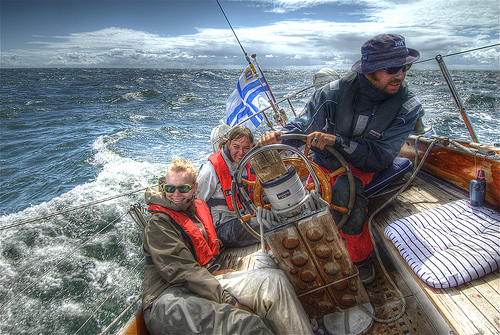English culture, especially North American culture, does not like the idea of personal responsibility. If I got drunk at a bar and ended up in a car accident, I could sue the bar for serving me. If I broke into your home and tripped over the dog, I could sue you for damages.
Pop psychology and daytime television have filled our heads with the idea that it’s never our fault. We can blame our parents, the system, or (more recently) our genetic makeup.
And what have we ended up with? A couple of generations of people who refuse to take responsibility for their lives, saying “but it’s not my fault” every time something bad happens.
Fortunately the pendulum seems to be on the move heading the other direction. More people are taking responsibility for their lives, whether it’s through ideas like the Law of Attraction, or just a simple decision to make choices rather than react.
Even the daytime field has changed. American media mogul Oprah, who used to revel in the cult of victimhood, now focuses her energy on people who make choices and who take full responsibility for their lives.
So what does that mean for us? What does it mean to take personal responsibility?
1. Be Aware Of Your Life
Often we don’t need to think about life; we just live it moving through life in a kind of trance, let the autopilot guide us. And while autopilot has its uses, many people give it permanent control. Unfortunately while the autopilot runs days, weeks, months or even years might whip by while we’re in this trance of doing.
2. Make Conscious Choices
Life is choice. Anyone who says “I had no choice” is lying. And while we don’t always have control over what comes at us externally, we always have a choice as to how we react. Getting up in the morning is a choice. Deciding to live is a choice. And the more you practice making conscious choices, the easier it gets.
3. Accept The Consequences
So you’ve made a choice and suddenly the results aren’t what you were expecting – at all. The easy road would be to start pointing fingers and saying to everyone in earshot: “It’s not my fault!” But know what? Blame doesn’t matter. The past is over. Accept the present situation, no matter how much it sucks and make new choices based on the best information you can gather in the moment.
By adopting these three simple steps, you can stop wishing your life would get better and leave the cult of victimhood. You can take control of your life and direct it to exactly where you want it to go.
Do you agree with these steps to taking more personal responsibility? Are there more steps not mentioned here? Please share your thoughts in the comments below.
Photo by Wili Hybrid






It’s SO important to take control of our lives and to accept our own personal responsibility. It’s so much easier to just blame things on someone or something else, but we have the power to control what we do and, most importantly, how we think about the world and the people around us. Taking personal responsibility for your attitude (something it’s taking me a lonnnnng time to do) is SO important.
Hi Alex,
“If I broke into your home and tripped over the dog, I could sue you for damages.”
I’m shocked when reading this. It somehow doesn’t make any sense.
Personal responsibility means we are taking control of our life. This is important as it means we are the driver of our life instead of being as a passenger.
Vincent
I once took an aikido class from a teacher who insisted we take responsibility for everything, including the weather. Luckily, this was in Honolulu where the sun shines 365 days a year.
I agree with taking responsibility. To blame others is to play the victim, and give away your power to others.
I do not agree with “taking control” of my life. I was a very controlling person for a long, long time, and it didn’t work out well at all. I finally learned to turn control over to a power greater than myself — I call it God — which was not only liberating, but gave me serenity and a faith I’d never had before.
Having done that, I still must take action and be accountable. To wit: take responsibility.
@Positively Present
“It’s not my fault” is a great line if you don’t want to take responsibility – it absolves us of all authorship of our actions – we’re just puppets of whatever we blame.
@Vincent
I was exaggerating in this case – it’s actually an urban myth, but there are lots of strange cases of suing for reasons no responsible person would ever consider doing.
@John
For me I’d call that letting go of ego and just doing. When we “take control” as you describe it, we try to manipulate everything including everyone else around us. We can’t control the things that happen to us – we can only take responsibility for our reactions.
Hey Alex – I often think about those crazy situations where people sue each other when in fact in the wrong. Taking responsibility is not only something we should be doing but can also free your mind state. Coming clean and owning up can often save friendships, relationships, jobs or even lives.
Hi Alex – Your comments are right-on. Deciding to live life on your terms and taking personal responsibility are on the same page as “attitude is everything.”
I also concur with the idea of collecting accomplishments instead of “stuff.” Keeping your life simple is quite liberating.
Thanks.
Dan Biby
nice post :) i would also like to add that we should not develop the habit of escaping and acting as if we have no problems because on the long term this ruins our lives
@Greg
I used to have trouble owning up to things mainly to admitting that I disagreed with someone, instead taking on the role of victim. Fortunately I’ve learned to leave that behind.
@Dan
Yes, attitude is the most important – it’s all about choosing our reactions to the world.
@Farouk
I agree – mini-escapes might be fun and relaxing, but living all the time escaping is not a good way to live.
Thanks for your article. I have long lamented this tendency towards refusing to take responsibility, which at times can be almost ludicrous. I think perhaps a combination of egotism, flowing from the liberations of the 1960’s, and the increasing affluence of modern societies is a factor in all this. But it’s really only one aspect of a general decline in civil behaviour anyway.
Keep up the good work.
“English culture, especially North American culture, does not like the idea of personal responsibility. If I got drunk at a bar and ended up in a car accident, I could sue the bar for serving me.”
– The Mcdonalds incident comes into mind: sue the restaurant for getting overweight.
@David
Yes, I think the pendulum has swung too far the other way after the rise of the Me Generation – it’s great to have a little bit of selfishness, bu it’s easy to go too far.
@Anthony
Yeah, that one I don’t get. Like the burgers were getting shoved down the person’s throat…
Dear Alex,
I really liked your concise and well constructed piece. There are a few areas I would like to add some, hopefully constructive, comments:
– Life is choice. I agree with this when we talk of the western / developed world where people have education or even the opportunity for education. Take somewhere like Sudan, where there are millions of people hungry, dying of disease or whatever, often many too young to understand – I do not think many of them have a choice. Choice is what we privilged few have and even the luxury of writing on blogs like this discussing the concept of choice. For many choice is a myth (or at least until they have enough education and or opportunity to understand the concept of choice) and I think that those of lucky enough to have choice (even when we refuse to recognise it) could do with bearing this in mind more often.
– Anyone who says “I had no choice” is lying. I know what you are saying but I don’t think that ‘lying’ is the appropriate language here. I think people often refuse to accept that they have a choice and therefore deny its existence, which I think is different to lying, which to me is a purposeful detraction from the truth (conscious or subconscious) of being able to choose a certain direction.
For some reason, in many social situations many English people talk about how ‘so and so made me drink’ or ‘I had no choice but to drink that shot’ and I think that the use of language is critical here and likely a reflection of the lack of self esteem for many who refuse to accept that they have a choice in these and many other situations. in fact, I think that your points 1 & 2 are interconnected. With so many people on autopilot and living by the societal rules and systems that have been put in place, they are too tired or bothered or confident enough to recognise that choice is something we face every second of the day.
Anyway, I could go on but alas I hope I have made some interesting comments on a post, which for the main, I enjoyed and thought was well written.
Best wishes, Matt
@Matt
Thanks for the feedback and I agree with you completely. Given that 99.9% of English blog readers come from the luxurious Western culture I made the decision to use strong language to shock people out of their complacency.
Also I strongly feel that our options are limited by what happens to us externally. For example, I spent 9 years living in chronic pain. My choices each day were limited to the choices of other people, but I had choices. I could choose how I was going to react to the situation.
When it comes to choices sometimes the consequences are unthinkable for us but it’s still a choice. Take the situation of a child bride in a chauvinistic culture – her choice is to get married at age 12 or die. That’s still a choice even though it doesn’t feel like one. Life is choice – sometimes incredibly hard ones, the concept of freewill is based in choice.
But this article isn’t aimed at someone in that situation – as I said in the opening sentence, it’s aimed at the culture of “it’s not my fault” that we’ve developed in North America.
@Alex Fayle | Someday Syndrome,
Good points and I hope other people were shocked out of their complacency!
Best wishes, Matt
More and more people take weird paths to solve situations. I truly believe they have lost the north because of their education in live, so on.
On the other hand, and talking about people who is inmune to their responsabilities, there is the opposite case, people who always feel responsible of everything. I’m interested in why we assume facts that are not our fault and don’t say a word in response.
Interesting post. Thanks.